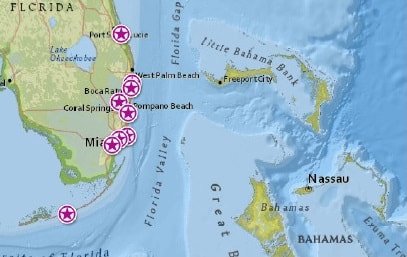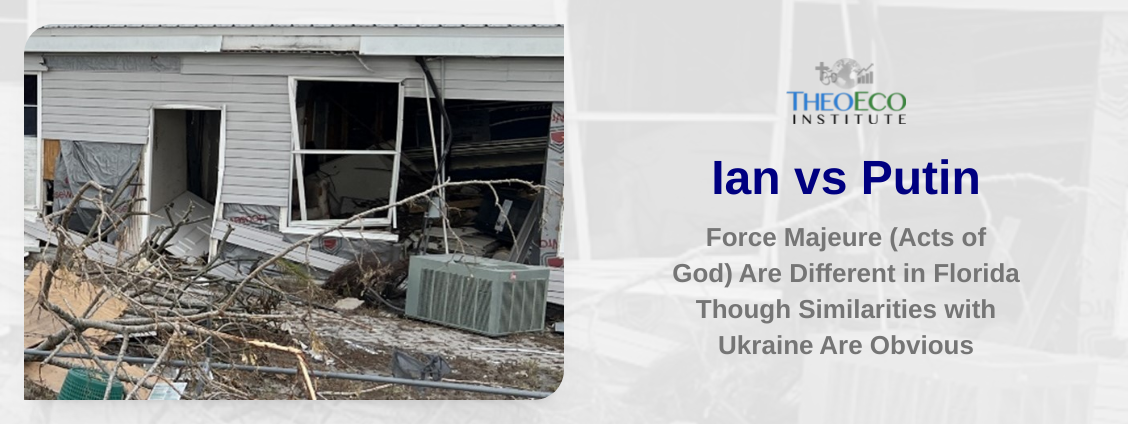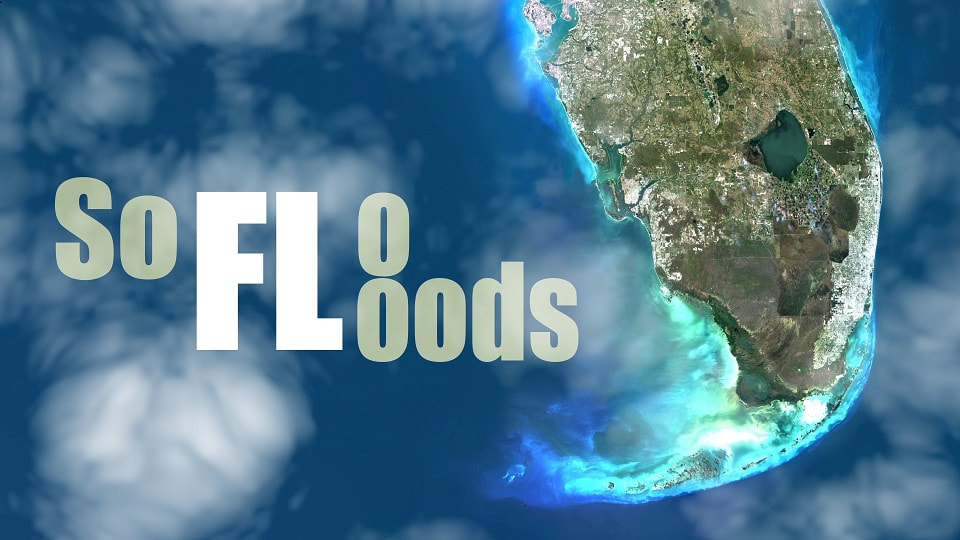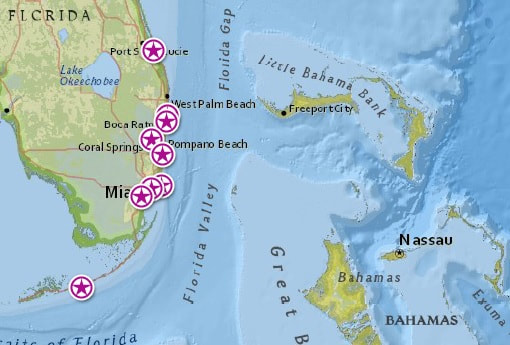|
Force Majeure (Acts of God) Are Different in Florida Though Similarities with Ukraine Are Obvious

On Wednesday, October 5, 2022, I went to Ft. Myers Beach to document the effects of Hurricane Ian for an upcoming redux of So Flo Floods, a film about flooding in South Florida, past, present, and future. Ian was a Category 4 hurricane with sustained winds of 150+ miles per hour (240+ km per hour) that made landfall at Ft. Myers Beach in the afternoon of Friday, September 30th. It pushed along a 15 ft (4.5 meters) storm surge.
Much of the original So Flo Floods focuses on the effects of past hurricanes, and predictions of the effects of a “Big One” hitting South Florida, particularly one hitting Miami. Well, a Big One hit a couple weeks ago, but it was on Florida’s southwest coast in the Ft. Myers Beach area. It then ripped through Florida to the northeast causing tens of billions of damage before exiting via Florida’s northeast coast near St. Augustine, hundreds of miles away. No longer do we need to theorize about what happens when a modern day Big One hits. Bottom line? In South Florida our war is with wind and water. In Ukraine our war is with Putin and Russia. The results of both are destroyed lives, homes, businesses, personal property, and neighborhoods that need resources to rebuild. Unfortunately, both rebuilds are likely to be under-resourced for lack of insurance payouts. Governments and private sources will (can) only do so much.
Similarities

We can see for ourselves what current day hurricanes mean in terms of damage, both insured and otherwise. We can also compare the effects to what I saw in Ukraine as delineated in Trek to Bucha Epilogue: Force Majeure (Act of God) – Economics. I hiked into Bucha two weeks after the Russians retreated on April 15, 2022. Turns out the effects of the war in Ukraine and the effects of Hurricane Ian have a lot in common. The pictures and video from Ft. Myers Beach reminded me of Irpin and Bucha.
Buildings trashed with windows blown out - As is always the case with such a powerful storm as Ian, windows are blown out everywhere. This was the first similarity I noticed with Bucha and Irpin. Many population centers hit – The effects of both catastrophes are seen in many places, not just one or two cities. Evacuations – In Florida, when a hurricane is bearing down folks that live close to the water are told to evacuate. In Ukraine people evacuate cities when they see the Russians coming. For any given missile attack the air raid sirens go off and citizens are urged into the bomb shelters. Many ignore the warnings – Many citizens ignore the sirens after many “false alarms” fail to materialize. Same in Florida where many ignore evacuation instructions. Most deaths from Ian were from the drowning of people who ignored evacuation orders. Most of Hurricane Ian's 100-plus victims in Florida died by drowning, data shows (foxweather.com) Lack of insurance - In Florida, most homeowners, certainly those with mortgages, have windstorm coverage. However far fewer have flood insurance. That means most will not be covered for damages from Ian since most of the damage is from flooding. In Ukraine, most are uncovered due to Force Majeure clauses even if they had coverage. Deserted - Like Irpin Ft. Myers Beach was basically deserted and I had to pass through police check points to get in and out. Of course, the checkpoints in Ukraine were manned with soldiers with AK-47’s who checked my passport repeatedly some days. In Ft. Myers Beach I was able to walk through unimpeded once I ditched my car.
Blown out windows in Ft. Myers Beach and Bucha. Can you tell which is which?
Gatherings - Even though these places were largely deserted there were stalwarts in both gathering to share what they had and enjoy each other’s fellowship. In Bucha it was early spring, and they needed community fires to cook and stay warm. In Ft Myers Beach temperatures were in the 80’s (High 20’s C).
Utilities and workers – On my visit the power was coming back throughout Ft. Myers though was still out on the beach. When I got to Bucha the power was just coming back on. Cell phones and internet service the same. In both places utility workers were on the scene and hard at work. Ice - Ice was scarce in both places. Damage to cars and property - Tremendous damage to cars and personal property is evident everywhere in both places. Floods are merciless. So, too, the Russians. In Ukraine losses are caused by machine guns, artillery, tanks, and looting. In Florida, flood and wind. Looting - Looting would be a much bigger problem in Ft. Myers Beach if it weren’t for the police closing the place down – and a well-armed citizenry, this being Florida and all. In Bucha the Russians took everything they could carry when they retreated.
Leadership - Fortunately, the leaders of both places came and brought focus to what was happening. In Ft. Myers President Biden and Governor DeSantis made their way to Ft. Myers the same day I did. (Joe Biden, Ron DeSantis address Hurricane Ian victims in Florida). President Zelensky made it to Bucha in about the same timeframe (5 days) after the Russians retreated (Zelensky visits battered Bucha, fears of widespread civilian massacres - YouTube)
Hurricanes can strike again, so too the Russians - Thankfully, Ian is gone. Though another hurricane could come at any time. Similarly, Russian troops are gone from the Kyiv suburbs but can theoretically return. Missiles can hit anytime. Monetary damages are similar – Insured losses from Ian are currently estimated between $41-$70 billion (Total Flood And Wind Losses From Hurricane Ian Range From $41 Billion To $70 Billion). In Ukraine the “Physical damage to Ukraine's buildings and infrastructure from Russia's invasion has reached roughly $60 billion and will rise further as the war continues,” World Bank President David Malpass said recently (World Bank estimates Ukraine physical damage at roughly $60 billion so far | Reuters).
Differences
Obviously, there are many things that couldn’t be more different. With no floods or high winds with Putin, nor missiles from Ian, the threats are not the same.
Boats - I don’t think I ever saw a boat in Ukraine. In Ft. Myers Beach they are everywhere…yet nowhere they should have been. I saw boats on top of cars, docks, mangroves, buildings, etc. They must have been having a grand time floating around in the water unencumbered by lines or navigators. But when the water went out they were stuck wherever the Spirt put them. It was a free-for-all for the boats, big and small, expensive and cheap. Resources – First, Florida’s economy is by itself many times that of Ukraine’s with $1.3 trillion- and $200 billion-dollar annual GDPs respectively. So, Florida has a lot more to work with from the “get go”. Add to this the resources of FEMA and payouts from insurance companies and there is no comparison. Caravans - I never saw the kind of caravans of resources flowing into Bucha or anywhere else in Ukraine, even weeks after the Russians left. In Ft. Myers the response was immediate and even the most outlying areas began to see resources and rescue efforts in a few days. Insurance Payouts - Force Majeure clauses are complicated in Florida. You have to have separate coverages for floods and wind damage. If you have both you are good. In Ukraine policyholders will normally be out of luck regardless.
Destroyed homes in Ft. Myers Beach and Bucha.
No defenses are available against hurricanes – True acts of Mother Nature, like storms and earthquakes are not defensible. You just have to prepare and then react with a flood of resources. Defenses against militaries like Russia’s can be prepared and pushed back as we’ve seen. Missile defenses can be highly effective for protecting population centers and high value targets like airports.
Supermarkets - One of the most vital elements of an economy at a local level are supermarkets. In Bucha they had all been pillaged and mostly blown out. Many supermarkets in Ft. Myers quickly reopened with generators mandated by law. Evacuations - Both Bucha and Ft. Myers Beach evacuated. The difference being Ft. Myers had detailed plans and instructions for its citizens. Bucha evacuated two weeks after the Russians had invaded. And in Irpin people were shelled as they tried to evacuate (Ukrainian city Irpin shelled as people try to evacuate; 8 killed - The Washington Post). No atrocities or mass graves in Florida - It appears no mass graves will be dug in Florida as when thousands of black migrant workers lost their lives in the floods after Lake Okeechobee spilled her banks due to the 1926 Hurricane. Citizens in mass graves were tortured and murdered by Russian soldiers in Bucha. Deaths – In Bucha alone 458 bodies, 419 with signs of shooting, torture, or violent trauma, and 39 apparently of natural causes have been found (Bucha massacre - Wikipedia). Ian, Florida’s deadliest hurricane since 1935, has been linked to the deaths of at least 119 people in the state, many of them older residents who lived near the coast (Many of Hurricane Ian’s Victims Were Older Adults Who Drowned - The New York Times).
Piles of Debris in Ft. Myers Beach and Bucha.
Closing
There are many items that go beyond easy comparison.
Refugees – The war in Ukraine has created millions of refugees fleeing their homes for what may be years, especially if rebuilding funds are limited. The long-lasting effects of Ian will certainly result in many people not returning though the numbers are far less. Hurricanes are true Acts of God – While war is often described as an act of God for insurance contracts, it is not, at least as compared to hurricanes. War is manmade. Ukraine is at war – Ukraine has demands on its resources which understandably prioritizes the frontlines. Resources that we expect to see in the USA simply cannot be matched in Ukraine. At least not without more help from the west which they deserve given the assurances of the Budapest Memorandum when Ukraine voluntarily gave up their nuclear weapons. In the end, while hurricanes are terrifying, they are not terrorism. Putin’s war has come to rely on terrorism to an even greater degree than at the start of the war as battlefield losses mount. Both disasters should be insurable events. Only Ian victims can count on sizable insurance payouts to recover. Ukraine’s citizens simply will not have this backstop. One thing that is very evident in both Ukraine and Florida is the Spirit that ties all people who empathize with the suffering of others. Most can relate to the awful situations they see their fellow humans enduring on TV no matter who they are. In Ukraine and Florida, they likely have an even greater appreciation for what their brothers and sisters thousands of miles away are dealing with.
0 Comments
The So FLo FLoods Competition Event was held live via Facebook Live on May 29, 2020 and included the premiere of the 56-minute version of So FLo FLoods, Q&A with our panel from the film, and the awards presentation. To see the actual Facebook Live event click here.
Congratulations to our winners: 1st Place and $250 My Miami Beach in 100 Years by David Tamen 2nd Place and $100 Envi Poem by Nikita A.G.LV.-Mitic 3rd Place and $50 A Flavor of the Past by Juliet Pizano For all the entries click here. We were also excited to see several “stars” from the film and other luminaries for the Q&A including:
Thanks to all that participated. See you next year! So FLo FLoods Competition Award Streaming Event For Students of Beach High - Panel Announcements5/22/2020 It’s almost here!
On Friday, May 29th at 2:30 in the afternoon we will be celebrating the excellent entries from Miami Beach High students to the So Flo Floods competition. We are very excited to announce several “stars” from the film will be available for the Q&A after the screening of the new 56-minute version:
We are also excited to have these luminaries as well:
And most of all, our entrants! Our So FLo FLoods Award Screening Event for Beach High students will take place online via Facebook Live and Zoom on May 29th at 2:30PM. Please join us for this special screening of the new 56-minute version of So FLo FLoods while we celebrate the students who have submitted entries for the competition.
We will have live online award presentations to winning students by award sponsor Pearl Benefits, with Q&A afterwards with representatives from the film. Winners receive: $250-1st place; $150-2nd place; $50-3rd place and will receive assistance to further develop their project over the rest of the school year. Please join us by going to TheoEco.org/Competition for the Facebook Live link on May 29th! By Steve Richards
We are just back from Jubal Studio in Kathmandu where we edited our original 73-minute version of So FLo FLoods to a snappier 56-minute version to satisfy the desires of museums, schools, and community centers for a quicker rendering. While it seemed impossible to cut a quarter of the film it turns out that we like it just fine – and if it enables more people to see it, we’re obviously good with that. The film’s treatment of South Florida’s flooding past, present, and future, are all intact as are the interviews (though trimmed a bit) with Professors Wanless and Weisskoff from the University of Miami, Paul George from HistoryMiami, Jacqui Thurlow-Lippisch from the SFWMD, author Robert Mykle, and the others. We are currently scheduling new screenings of the film for Spring and Summer and are set to premiere the new version on April 3rd on Miami Beach at the So FLo FLoods Competition Awards Ceremony at Miami Beach Senior High. Be on the lookout for more information as we get closer to the event. To see the film’s updated trailer just click on the following link: https://vimeo.com/248031362. You can keep up with all we are doing at SoFloFloods.com and on our facebook page: @SoFloFloods. So FLo FLoods and the Bahamian Relief Screenings taking place throughout South Florida have many Anglican connections as mentioned in our last blog: About the Episcopal Church, the Anglican Communion, and the Bahamas. Since then we’ve had Bahamians who have asked if they could show the film to their family in the Bahamas. We've said, "Yes, of course!" and provided a link to the film, which we are very happy to do for any that want to see it in the Bahamas.
By Steve Richards  One can see in this map that several of the So FLo FLoods Episcopal Bahamian Relief churches (Stars) are closer to the Bahamas than they are to each other. One can see in this map that several of the So FLo FLoods Episcopal Bahamian Relief churches (Stars) are closer to the Bahamas than they are to each other. The Episcopal Church is a United States based member of the worldwide Anglican Communion, which began nearly 500 years ago when Henry VIII decided that, as much as he loved the Roman Catholic Church, he valued a divorce even more. Why? It’s a long story, but basically he wanted an heir and Ann Boleyn was the girl he thought could give him one. In the end, Ann lost her head and the church in Rome lost England.
 Most documentaries – most films for that matter – have a difficult time seeing the light of day. Few crack the awareness of most audiences. Even big budget films with large scale theatrical releases and marketing budgets have a difficult time cracking the awareness of most people. Little documentaries like So FLo FLoods have an exceedingly difficult time getting anywhere. Most try the film festival route and hope they have enough to catch the eye of a distributor, who if they decide to distribute a film basically control the film from that point onward.
|
Archives
April 2024
Categories
All
|
TheoEco Institute is a 501(c)(3) nonprofit organization. Contributions to TheoEco in the United States are tax exempt to the extent provided by law.
















 RSS Feed
RSS Feed